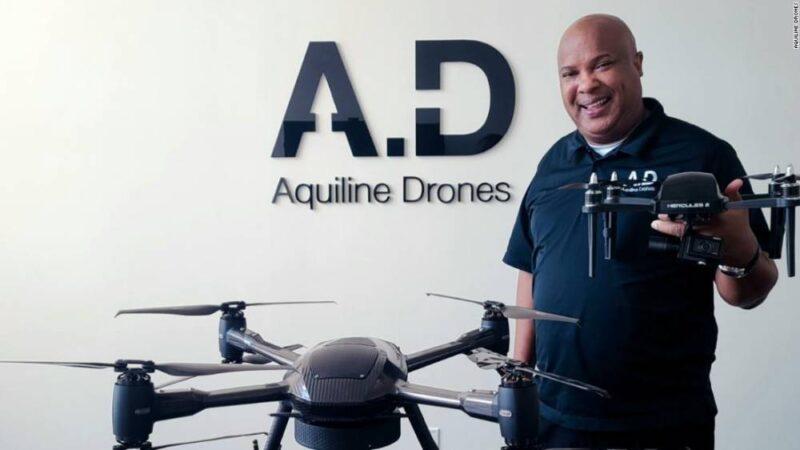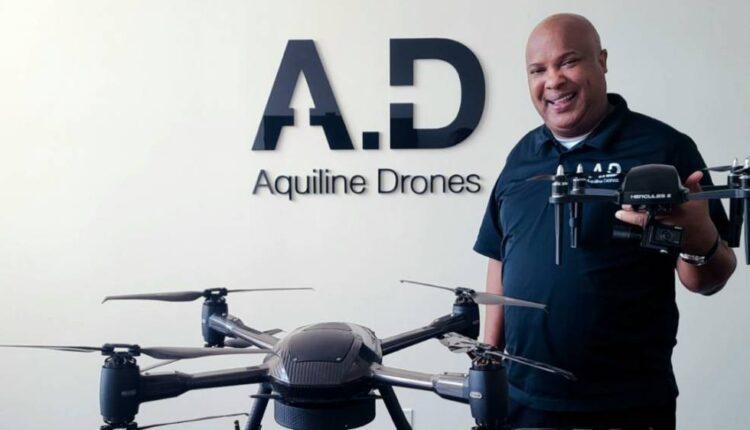Entrepreneur hopes to create a gig economy for out-of-work airline pilots — flying drones instead of planes
Austin, Texas (CNN Business)With mass layoffs at US air carriers expected this fall, airline pilots like Michelle Bishop are anticipating the unwelcome reality that pilots like herself may soon be left without stable work.
“I’m just trying to fly as much as I can, while I can, because I love it,” Bishop, who has worked as an airline pilot for more than 20 years, told CNN Business. In her recent downtime, Bishop said she spent hours scrolling through LinkedIn listings and other job sites searching for a line of work that wouldn’t force her to spend all day at a desk.One opportunity piqued her interest: Piloting drones.
Aquiline Drones, a Connecticut-based startup, wants to create a gig economy for drone operators, pledging to roll out a simple smartphone app about two months from now that allows anyone with a license to take on short-term jobs, from capturing aerial footage at a wedding to snapping pictures of bridges and roadways for a public works department. Essentially, the startup wants to be like Uber or Lyft. And its founder, Barry Alexander, envisions thousands of airline pilots becoming its certified drone operators.Read More

Entrepreneur Barry Alexander hopes to create a gig economy for out-of-work airline pilots, flying drones instead of planes.Currently, certified drone operators are few and far between: There’s less than 200,000 in the United States. Since 2016, the Federal Aviation Administration has required drone operators to obtain certification.Aquiline’s goal is to help license new drone operators by the thousands — and most of them, said Alexander, will be former airline pilots.The company’s licensing program, called “Flight to the Future,” is slated to begin virtual classes on September 1. Anyone can sign up for the six-to-eight week training program for $1,000, and Aquiline developed a separate $800 course tailored for pilots who already understand the ins-and-outs of aviation terminology, regulations and weather monitoring. As part of the program, Aquiline will walk students through the Federal Aviation Administration’s licensing process and even set licensed students up with their own LLC, the option to finance a $4,000 drone and insurance at an $1,500 annual rate directly through Aquiline.The test for drone pilot certification isn’t easy, but there are online training programs that are less expensive than Aquiline’s offer. Alexander also said all Aquiline drone pilots must go through the company’s “Flight to the Future” program and use the Aquiline-provided drone, which is semi-autonomous, to ensure it works with the company’s back-end software systems.Already, Alexander said, more than 1,500 members of the general public have signed up, along with 2,000 pilots, including Bishop.”I actually know zero about drones,” Bishop told CNN Business. “But if I was going to have to stop flying, I wanted the opportunity to learn something new.” Being able to set her own schedule is also an appealing prospect, she said.If Aquiline succeeds, newly licensed drone pilots like Bishop will form a core network of contractors that will log onto Aquiline’s drone-for-hire app each day and pick a gig in their area. The jobs are expected to pay a minimum of $300 — at a $150 per hour rate, Alexander said.The business model comes straight from ridesharing business’ playbook, and it’s a model that’s hailed by gig economy proponents as one that offers workers flexible hours and a “be your own boss” ethos. But it’s also a model that comes with some drawbacks for workers: Independent contractors are not guaranteed affordable health insurance, paid time off, or any of the other benefits offered to full-time workers. And some gig workers report working long hours without making a livable income.The question remains if there will be robust demand for a drone-for-hire service.Drones have exploded in popularity in recent years, and they’ve gone from being marketed as a fun tech gadget to serving real-world purposes, such as policing, aiding disaster relief missions, or monitoring construction progress. But they aren’t a very common sight. The government and many US citizens are wary of the potential for drones to be used for spying and that they could fly into larger aircraft. A 2017 Pew Research study found that more than half of Americans felt that drones should not be allowed to operate near people’s homes. And drones — commercial and recreational — remain tightly regulated and monitored by the FAA.Alexander said he’s aware of the perception, and that’s something he hopes to change as drone businesses grow. He hopes that “through public education and public involvement, we one day gain the [public’s] trust, support and endorsement so that we could get drones to live alongside humans.”He said that Aquiline has also conducted polls of the general public and of corporations that show there is strong interest in a drone-for-hire service.
Bishop, the pilot who plans to take Aquiline “Flight to the Future” licensing course, said she isn’t pinning all of her hopes on the program. She’s also interested in getting a real estate license and remains open to other options. But she is optimistic about Aquiline.”My idea is to plan for the worst and hope for the best,” she said. “Even if everything goes back to the way it was five months ago, [the drone certification program] is still not a lost investment, because it’s still something interesting that I can do and still fly full time.”
Source: edition.cnn.com

